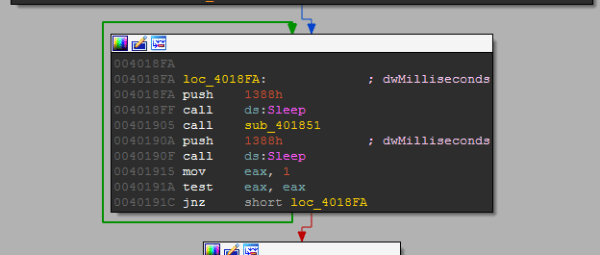Today I’m sharing on exploiting the null pointer dereference vulnerability present in the HackSysExtreme Vulnerable Driver.
The Vulnerability
You can view the source from here.
[code language=”C” highlight=”42,58,73″]
NTSTATUS TriggerNullPointerDereference(IN PVOID UserBuffer) {
ULONG UserValue = 0;
ULONG MagicValue = 0xBAD0B0B0;
NTSTATUS Status = STATUS_SUCCESS;
PNULL_POINTER_DEREFERENCE NullPointerDereference = NULL;
PAGED_CODE();
__try {
// Verify if the buffer resides in user mode
ProbeForRead(UserBuffer,
sizeof(NULL_POINTER_DEREFERENCE),
(ULONG)__alignof(NULL_POINTER_DEREFERENCE));
// Allocate Pool chunk
NullPointerDereference = (PNULL_POINTER_DEREFERENCE)
ExAllocatePoolWithTag(NonPagedPool,
sizeof(NULL_POINTER_DEREFERENCE),
(ULONG)POOL_TAG);
if (!NullPointerDereference) {
// Unable to allocate Pool chunk
DbgPrint("[-] Unable to allocate Pool chunk\n");
Status = STATUS_NO_MEMORY;
return Status;
}
else {
DbgPrint("[+] Pool Tag: %s\n", STRINGIFY(POOL_TAG));
DbgPrint("[+] Pool Type: %s\n", STRINGIFY(NonPagedPool));
DbgPrint("[+] Pool Size: 0x%X\n", sizeof(NULL_POINTER_DEREFERENCE));
DbgPrint("[+] Pool Chunk: 0x%p\n", NullPointerDereference);
}
// Get the value from user mode
UserValue = *(PULONG)UserBuffer;
DbgPrint("[+] UserValue: 0x%p\n", UserValue);
DbgPrint("[+] NullPointerDereference: 0x%p\n", NullPointerDereference);
// Validate the magic value
if (UserValue == MagicValue) {
NullPointerDereference->Value = UserValue;
NullPointerDereference->Callback = &NullPointerDereferenceObjectCallback;
DbgPrint("[+] NullPointerDereference->Value: 0x%p\n", NullPointerDereference->Value);
DbgPrint("[+] NullPointerDereference->Callback: 0x%p\n", NullPointerDereference->Callback);
}
else {
DbgPrint("[+] Freeing NullPointerDereference Object\n");
DbgPrint("[+] Pool Tag: %s\n", STRINGIFY(POOL_TAG));
DbgPrint("[+] Pool Chunk: 0x%p\n", NullPointerDereference);
// Free the allocated Pool chunk
ExFreePoolWithTag((PVOID)NullPointerDereference, (ULONG)POOL_TAG);
// Set to NULL to avoid dangling pointer
NullPointerDereference = NULL;
}
#ifdef SECURE
// Secure Note: This is secure because the developer is checking if
// ‘NullPointerDereference’ is not NULL before calling the callback function
if (NullPointerDereference) {
NullPointerDereference->Callback();
}
#else
DbgPrint("[+] Triggering Null Pointer Dereference\n");
// Vulnerability Note: This is a vanilla Null Pointer Dereference vulnerability
// because the developer is not validating if ‘NullPointerDereference’ is NULL
// before calling the callback function
NullPointerDereference->Callback();
#endif
}
__except (EXCEPTION_EXECUTE_HANDLER) {
Status = GetExceptionCode();
DbgPrint("[-] Exception Code: 0x%X\n", Status);
}
return Status;
}
[/code]
As usual, everything is clearly explained in the source. At line 42 the ‘userValue’ is compared with the value ‘0xBAD0B0B0’ and if it fails at line 58 the ‘NullPointerDereference’ value is set to NULL and at line 73 the value ‘NullPointerDereference’ is not validated whether it’s NULL before calling the callback function.
Let’s disassemble and see it closely. As you can see, if the provided ‘MagicValue’ is wrong the value of ‘NullPointerDereference’ is set to NULL to avoid the dangling pointer.
(more…)












